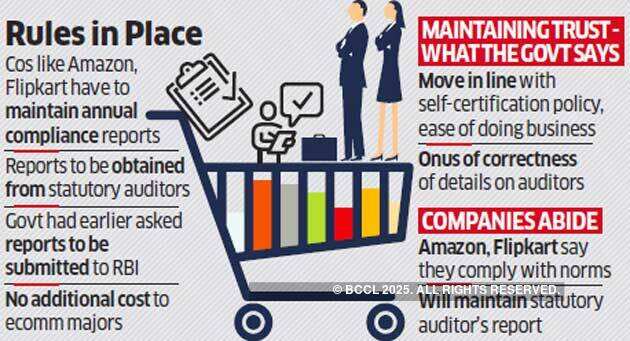 NEW DELHI | BENGALURU: September 30 every year is now a critical date in business calendars of ecommerce majors — that’s the deadline for the likes of Amazon and Flipkart to ready their annual compliance reports as per FDI norms.
NEW DELHI | BENGALURU: September 30 every year is now a critical date in business calendars of ecommerce majors — that’s the deadline for the likes of Amazon and Flipkart to ready their annual compliance reports as per FDI norms.Statutory auditors will compile these reports. However, the government has eased an earlier certification rule that required ecommerce firms to submit these reports to RBI. Sources said the change happened because the central bank had questioned the need for its participation in the process.
As of now, the government reviews compliance on the basis of internal reports of ecommerce companies. Ecommerce FDI comes under the ambit of Section 15 of the Foreign Exchange Management Act (FEMA). FDI-funded marketplaces are only allowed to lend their platforms to third-party sellers and such entities are barred from holding any stock or selling own goods directly to customers. Rules also disallow ecommerce marketplaces from having equity in any seller and entering into exclusive selling pacts with any vendor.
“Ecommerce marketplace entity with FDI shall have to obtain and maintain a report of statutory auditor by 30th of September every year for the preceding financial year confirming compliance of the ecommerce guidelines,” the government said in a notification issued on Thursday.

Press Note 2
Last year, the Department for Promotion of Industry and Internal Trade (DPIIT) had issued Press Note 2 of 2018 that required ecommerce marketplace entities to “furnish a certificate along with a report of statutory auditor to Reserve Bank of India confirming compliance… by September 30 of every year”.
“This is in consonance with the government’s policy of self-certification but the onus of the correctness of the details lies with the auditors,” said DPIIT secretary Guruprasad Mohapatra.
“This is a reinstatement of last year’s policy…while it does not mean extra cost to these companies, they will have to get reviews and third-party validation done by auditors,” said Akash Gupt, partner at PwC.
“Amazon has a high bar for compliance and we continue to comply with all applicable laws,” said an Amazon spokesperson. “Flipkart Marketplace is in full compliance of the governing FDI laws in the country and we are okay to maintain statutory auditor’s report for the same as per the notification,” said a Flipkart spokesperson.
The department had also stipulated that the inventory of a vendor will be deemed to be controlled by the marketplace if more than 25% of the vendor’s purchases are from the marketplace entity, including its wholesale unit. The marketplace entity or its group companies cannot have control over inventory under the FDI rules.
Commerce and industry minister Piyush Goyal has repeatedly warned ecommerce companies of strict action if they don’t halt predatory pricing on their platforms, flouting FDI rules. The issue also figured in a discussion Goyal had with Amazon India head Amit Agarwal on November 5.
SINGLE-BRAND RETAIL
In the same notification, the government said that in proposals involving foreign investment beyond 51%, sourcing of 30% of the value of goods procured, shall be done from India, preferably from MSMEs, village and cottage industries, artisans and craftsmen.
Such entities operating through brick-and-mortar stores are also allowed retail trading through ecommerce.
“However, retail trading through ecommerce can also be undertaken prior to opening of brick-and-mortar stores, subject to the condition that the entity opens brick-and-mortar stores within two years from date of start of online retail,” the government said.
No comments:
Post a Comment